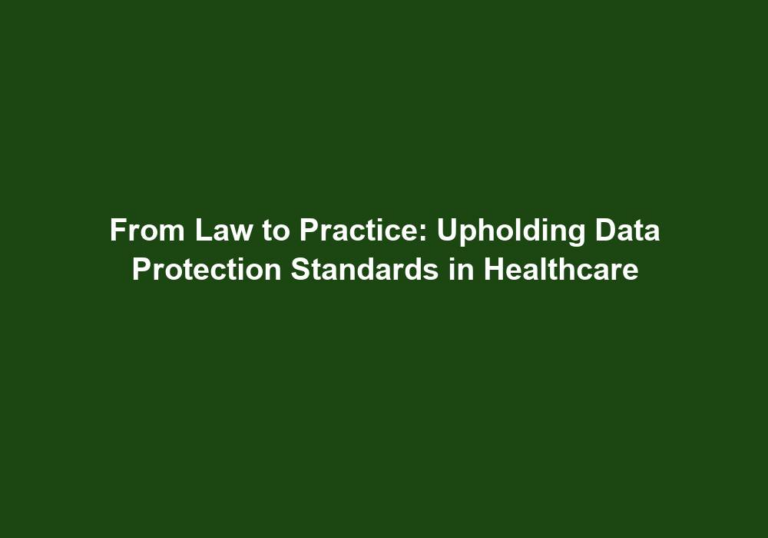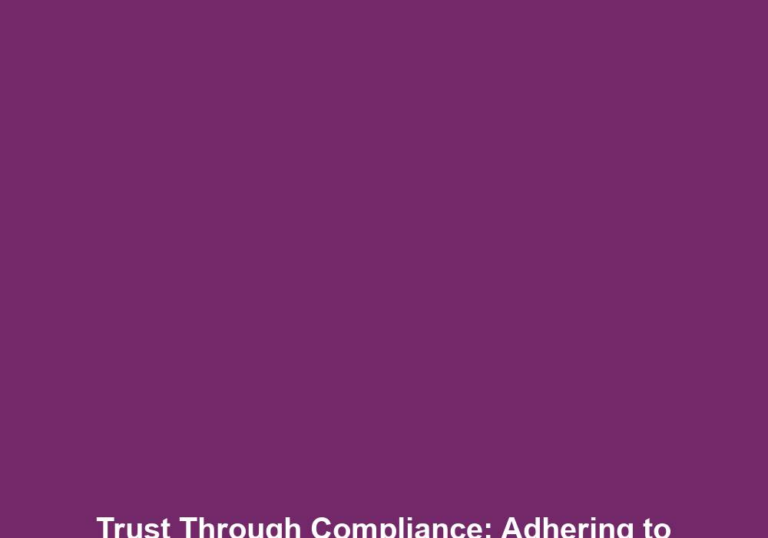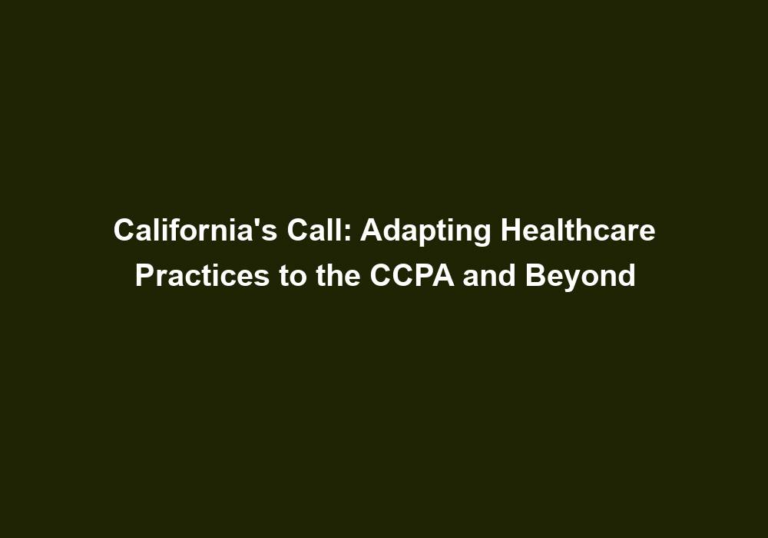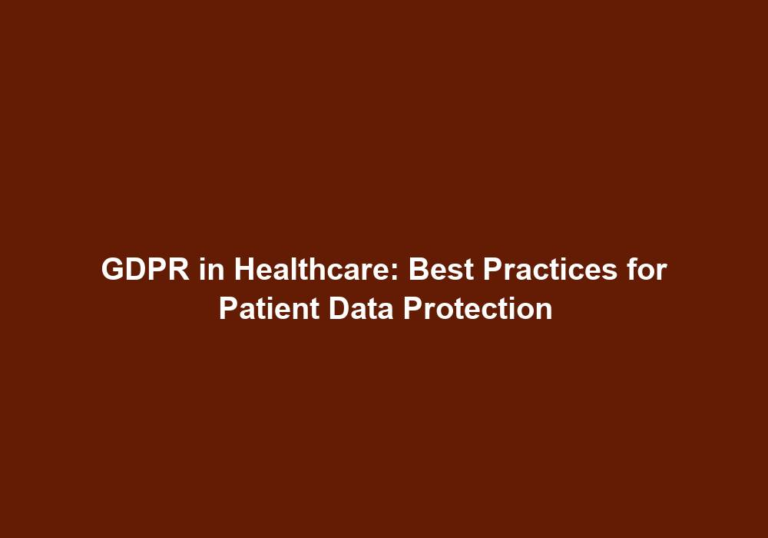Healthcare Under CCPA: Complying with Domestic Data Protection Norms
In today’s digital age, data protection has become a paramount concern for various industries, including healthcare. With the implementation of the California Consumer Privacy Act (CCPA), healthcare organizations must ensure that they comply with the domestic data protection norms to safeguard patient information and maintain trust. This article will delve into the key aspects of CCPA compliance in the healthcare sector and provide practical insights for healthcare providers.
Understanding CCPA and Its Relevance in Healthcare
The California Consumer Privacy Act (CCPA) is a comprehensive data protection law that came into effect on January 1, 2020. It aims to enhance consumer privacy rights and provide citizens with greater control over their personal information. While CCPA primarily focuses on protecting consumer data within the realm of commercial businesses, healthcare organizations also fall under its purview due to the vast amount of sensitive patient information they handle.
The healthcare sector handles a wide range of personal information, including medical records, insurance details, and contact information. Therefore, it is essential for healthcare providers to understand and comply with the key provisions of CCPA to ensure the privacy and security of patient data.
Key Provisions of CCPA Impacting Healthcare
- Data Collection and Disclosure: Healthcare providers must inform patients about the types of personal information collected, the purposes for which it is used, and the categories of third parties with whom the information is shared. Prior consent from patients is required before their personal data can be collected or disclosed.
Healthcare organizations should implement transparent data collection practices and clearly communicate to patients about the information they collect and how it will be used. This can be done through comprehensive privacy policies and notices. By providing patients with this information and obtaining their consent, healthcare providers can establish trust and comply with CCPA requirements.
- Patient Rights: CCPA grants patients certain rights regarding their personal information, such as the right to access, delete, and opt-out of the sale of their data. Healthcare organizations must establish processes to accommodate these rights and provide mechanisms for patients to exercise them effectively.
To comply with CCPA, healthcare providers should establish efficient systems to handle patient requests related to their personal information. This can include providing access to their data, deleting it upon request, or allowing them to opt-out of the sale of their information. By respecting and facilitating these rights, healthcare organizations can demonstrate their commitment to patient privacy and comply with CCPA regulations.
- Data Security and Breach Notification: Healthcare providers must implement reasonable security measures to safeguard patient data and prevent unauthorized access or disclosure. In the event of a data breach, organizations are obligated to notify affected individuals and appropriate authorities within a specified timeframe.
Ensuring data security is crucial for healthcare organizations to comply with CCPA. They should implement robust security measures, such as secure storage, encryption, and access controls, to protect patient data from breaches. Regular security audits can help identify vulnerabilities and mitigate risks. In the unfortunate event of a breach, healthcare providers should have a well-defined breach notification process in place to promptly inform affected individuals and authorities, as required by CCPA.
- Non-Discrimination: CCPA prohibits healthcare organizations from discriminating against patients who exercise their privacy rights. This means that patients cannot be denied medical services, charged different prices, or receive a lower quality of care based on their privacy choices.
Healthcare providers should ensure that their policies and practices do not discriminate against patients who exercise their privacy rights under CCPA. This can include providing equal access to medical services, maintaining consistent pricing, and delivering the same level of care to all patients, regardless of their privacy preferences. By upholding non-discrimination principles, healthcare organizations can comply with CCPA and prioritize patient privacy and care.
Compliance Strategies for Healthcare Providers
To ensure compliance with CCPA, healthcare organizations can adopt the following strategies:
Conduct a Data Audit and Mapping
Perform a thorough data audit to identify the types of personal information collected, stored, and shared within the organization. Map the flow of data to understand how it is processed and identify potential vulnerabilities. This exercise will help healthcare providers in implementing appropriate safeguards and ensuring compliance with CCPA regulations.
By conducting a data audit and mapping, healthcare organizations can gain a comprehensive understanding of the personal information they handle and identify any potential risks or vulnerabilities. This knowledge allows them to implement appropriate safeguards and security measures to protect patient data.
Update Privacy Policies and Notices
Review and update privacy policies and notices to include the required information under CCPA. Inform patients about their rights, data collection practices, and the purposes for which their information is used. Transparency is key to building trust with patients and demonstrating compliance with data protection norms.
Healthcare providers should regularly review and update their privacy policies and notices to align with CCPA requirements. These documents should clearly communicate to patients their rights, the types of data collected, the purposes for which it is used, and the categories of third parties with whom it is shared. By providing this information in a transparent manner, healthcare organizations can build trust and comply with CCPA.
Implement Robust Data Security Measures
Healthcare organizations should implement robust security measures to protect patient data from unauthorized access or disclosure. Secure storage, encryption, access controls, and regular security audits are essential to maintain data integrity and mitigate the risk of breaches. By prioritizing data security, healthcare providers can safeguard patient privacy and meet CCPA requirements.
Data security should be a top priority for healthcare organizations. Implementing measures such as secure storage systems, encryption of sensitive data, and strict access controls can significantly reduce the risk of unauthorized access or disclosure. Regular security audits help identify and address any vulnerabilities or weaknesses in the system, ensuring the protection of patient data.
Establish Data Subject Request Processes
Create efficient processes to handle data subject requests, such as providing access to personal information, deleting data, or opting out of data sales. Designate responsible personnel or teams to handle these requests promptly and ensure compliance with CCPA timelines. Streamlining these processes will enhance patient satisfaction and compliance with their privacy rights.
To comply with CCPA, healthcare organizations should establish well-defined processes for handling data subject requests. This includes providing mechanisms for patients to access their personal information, requesting the deletion of their data, or opting out of data sales. Designating responsible personnel or teams to handle these requests promptly and ensuring compliance with CCPA timelines are crucial for maintaining patient satisfaction and privacy.
Educate Employees on Privacy Practices
Training employees on data protection practices is crucial for CCPA compliance. Healthcare providers should conduct regular privacy awareness programs to educate employees about their responsibilities in handling patient data, recognizing potential risks, and understanding the importance of maintaining patient privacy. Well-informed employees contribute significantly to mitigating data breaches and ensuring compliance.
Employees play a vital role in safeguarding patient data and ensuring CCPA compliance. Regular privacy awareness programs help educate employees about the importance of patient privacy, their responsibilities in handling personal information, and the potential risks associated with data breaches. By investing in employee education, healthcare organizations can strengthen their data protection practices and minimize the risk of non-compliance.
Conclusion
In the ever-evolving digital landscape, healthcare providers must prioritize data protection and comply with domestic data protection norms like CCPA. By understanding the key provisions of CCPA impacting the healthcare sector and implementing appropriate strategies, organizations can safeguard patient information, respect individual privacy rights, and foster trust in the healthcare ecosystem. Compliance with CCPA not only ensures legal adherence but also enables healthcare providers to provide quality care while respecting patient privacy.







